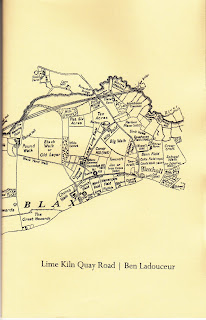Notes From A Cartywheel
Christine McNair
Ottawa: AngelHousePress, November 2011
A cartwheel is a strange thing. It implies movement but also return. It is cyclical. It is repetition with change. One arrives somewhere familiar but not quite the same as where one started. The cartwheel, or cartywheel, is an object of interest for Christine McNair. From her cartywheel press, to her notes from a cartwheel blog (“here's the part where we say what we mean & we mean what we say”), and now this chapbook, Notes From A Cartywheel (Ottawa: AngelHousePress, 2011), her exploration of the concept over the last few years has been wide and varied. She is also in the process of editing and producing an anthology focused on cartwheels. Her call for submissions draws attention to the productive capacity of the image:
cart·wheel (kärt![]() hw
hw![]() l
l![]() , -w
, -w![]() l
l![]() )
)
n. 1. A handspring in which the body turns over sideways with the arms and legs spread like the spokes of a wheel. 2. Slang A large coin, such as a silver dollar.
An open call for cartwheels: poems or quite short fiction relating to the cyclic, cartwheels, cart wheels, or any variation thereof. Loose interpretations are quite acceptable. (For example: cartwheels, but also cart wheels (see: cart, vehicle for transport), cartwheel hats, saint catherine and her wheel, catherine wheels, cartwheel coronal ejections, cartwheel neurons, cartwheel galaxies, cartwheel silver dollars, anything related to the cyclic, etc, etc, etc.)
In what sense are these poems “notes” from cartwheels? The title suggests the poems are written from within cartwheels, that the perspectives are perhaps moving laterally and circularly. These poems are anything but static. The book includes a series of poems built as anagrams:
four
a cloned involution
unlaced violin onto
calved lotion union
unlaced volution on
unclad voile notion
nonactive loud lion
invocation dull one
lilac devotion noun
colonial devout in
continual dove lion
lunatic loved onion
contain unloved oil
a lucid violent noon
a novice dull notion
an uncool violent id
These exercises in rearranging are astonishing. The central line in each is bookended by variations on the initial syllables and letters. The sounds are effectively turning cartwheels around one another. Each subsequent line is familiar but altered. Origins are recalled, but the meanings and perspectives have changed. McNair reduces language to component aural (musical?) parts, and unlocks reciprocal and competing meanings in the process. She takes a simple idea and creates tremendous movement.
Notes is a book of great variety. An untitled poem arranges words and type in a grid, horizontally and vertically, establishing a field of meaning that lacks a fixed referent. “biblio non-grata” catalogues search results for “cartwheel” from amazon and chapters, a list that runs from children’s titles to obscure scientific objects. Other poems, structured as lists, are experiments in contrast: “I am frank, honest, full of vigor and ambition. I am amiable and sociable. / I have problems being open. I accept solitude” (“five”). There are prose sections focused on a character named Catherine (“I Catherine, useless entrust myself to you”). Speakers confront direction and misdirection, knowledge and ignorance: "there’s due course then there’s also a fixed lack of relative position spiral delicious over black angled highway there’s coursework to be done / you lost your maps I pinned them to your black pants you still lost them you didn’t care / I play pick-me-up with bits of this and that and those I can't remember if we'll get there in due course" ("ten").
An important line in the book closes “five”: “I persevere.” The chapbook is committed to generative possibilities and contradictions of the cartwheel. It explores language through this central image, pushing as far as the words, as the letters, can bear. In “how to say sweetheart” the poem breaks down into description of the written marks of letters: “curve sharp curve curve / sharp sharp curve curve” before settling on “dot dot dot dot.” What is most admirable in the chapbook is McNair’s free exploration of a host of component parts of language and communication (sentences, images, words, syllables, written signs). She perseveres through meaning and non-meaning, privileging neither. Playful and free utterance, the joy of sound and image, are the core of Notes From A Cartywheel. The youthful exuberance of cartwheels seems an entirely apt anchor for McNair’s writing.
AngelHouse deserves acknowledgement for the production of the book. As usual, the press uses lovely paper stock and thoughtful, personal design. A series of scanned objects illustrate the poems, ranging from wooden type and coins, to polaroids and jewellery. The images extend the language of the poems, as well as assert the varied dimensions and modes of communication McNair is interested in.
McNair has been successful in recent years. She was shortlisted for the 2011 Robert Kroetsch Award for Innovative Poetry, she has seen broadsides published by AngelHouse and above/ground, her work appeared in the astoundingly beautiful anthology Dinosaur Porn (Toronto: Ferno House & The Emergency Response Unit, 2010.), she read at VERSeFest, she took part in the most recent iterations of jwcurry’s Messagio Galore (takes VII and VIII), and her first trade collection, Conflict, is forthcoming from BookThug in 2012. She is an exciting poet in Ottawa, and an active member of the community (we cannot forget her hosting duties on CKCU’s Literary Landscapes). McNair is due a trade collection. Conflict will be an exciting book. In the meantime, go buy Notes From A Cartywheel, the poet and the press are deserving.
Notes From A Cartywheel is being launched in Thursday December 1. Full event information here.








